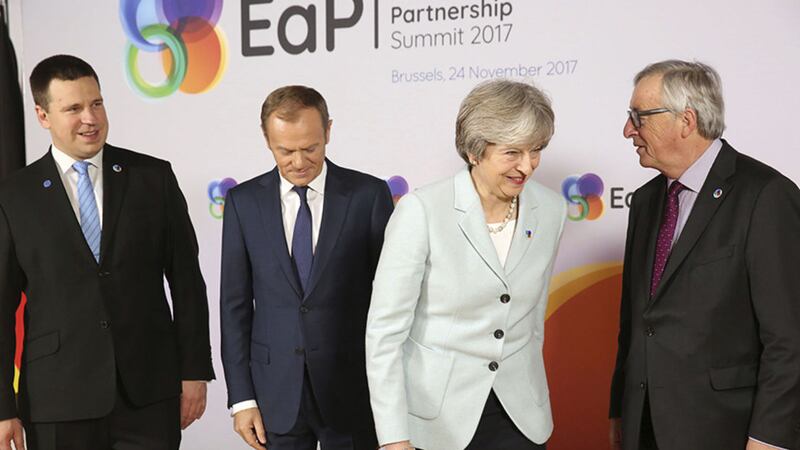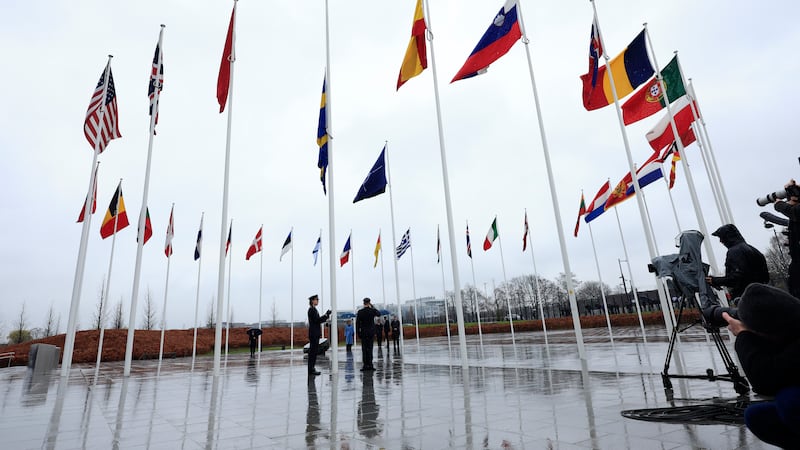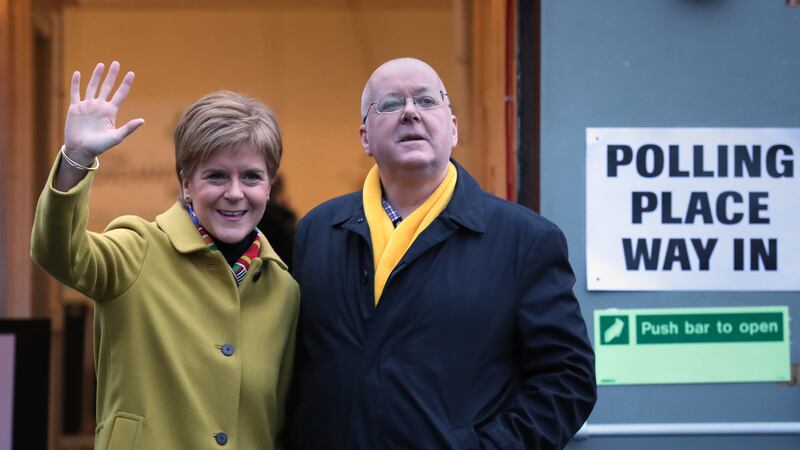Northern Ireland's membership of the EU customs union after Brexit is "a matter for negotiations", Downing Street has suggested.
Dublin is pushing hard for assurances from London that there will be no "hard border" in Ireland, warning that deadlock in Brexit negotiations cannot be broken until the issue is resolved.
With Britain committed to withdrawing from the customs union and the single market, Dublin's foreign minister Simon Coveney said on Friday it was difficult to see how border checks could be avoided if it resulted in "regulatory divergence" between the north and the Republic.
Taoiseach Leo Varadkar has previously suggested a "bespoke" arrangement similar to that operated on the Isle of Man could be reached under which Northern Ireland, or the whole of the UK, continues to observe the rules of the single market and customs union without necessarily remaining a member of them.
But DUP leader Arlene Foster warned against any divergence between the regulatory framework of Northern Ireland and Britain, telling BBC Radio 4's Today programme: "What we don't want to see is any perception that Northern Ireland is in any way different from the rest of the UK, because that will cause us great difficulties in relation to trade.
"The single market that really matters to us is the single market of the United Kingdom."
She accused the Dublin government of "using the negotiations in Europe to put forward their views on what they believe the island of Ireland should look like in the future".
Asked at a regular Westminster media briefing on Friday whether Northern Ireland could remain in the customs union following Brexit, a Downing Street spokesman said: "That is a matter for negotiations.
"Our position on Northern Ireland has been set out in the papers and we need to continue to negotiate to find an innovative way forward."
A Downing Street source later insisted that the government's position that the whole of the UK will leave both the customs union and single market after Brexit has not changed.
Arriving in Brussels for a gathering of leaders from the EU and former Soviet states, British Prime Minister Theresa May said it was time to move on to the "next stage" in the negotiations, including talks on a free trade deal.
However Mr Coveney insisted EU leaders would not give the green light for the phase two negotiations to begin at their summit in December unless there was progress on the border issue.
He said British assurances on the issue were "aspirational" and that there had to be a "credible roadmap" from the UK setting out how they would ensure there was no return to a hard border.
"We can't move to phase two on the basis of aspiration," said Mr Coveney.
"We have move to phase two on the basis of a credible road map or the parameters around which we can design a credible road map to ensure that it doesn't happen," he said.
"The truth is that if we see regulatory divergence between the two jurisdictions on the island of Ireland it is very hard to see in that scenario how you avoid hard border checks.
"So we need progress on this issue in the context of the regulatory divergence issues.
"I hope and expect that we can get that by December so that we can all move on.
"If we can't, then I think there is going to be a difficulty coming up."
Mr Coveney added that the other member states were fully behind the Republic's stance on the issue.
"I don't think Ireland will have to block anything on its own. There is absolute solidarity across 27 countries here. They are with Ireland on this," he said.
"We are not talking about a 'no deal' here. What we are talking about is whether we can move on to opening up phase two in parallel with phase one issues in December.
"Without sufficient progress on the Irish issues that can't happen."
Mrs May said she hoped the EU and the UK would be able to "step forward together" into the second phase of the negotiations.
"These negotiations are continuing but what I am clear about is that we must step forward together," she said.
"This is for both the UK and the European Union to move onto the next stage."
The British prime minister is due to hold one-to-one talks with European Council president Donald Tusk, after he warned last week that the phase two negotiations would not get the go ahead at the December summit unless there was further progress on the terms of Britain's withdrawal by the start of the month.
Since then the cabinet has met to discuss what it would be prepared to pay to settle the UK's "divorce bill" in order to end the stalemate.
Mr Tusk will be expected to probe her on reports that ministers agreed to double the sum originally put on the table by Mrs May to around £40 billion.
However it is thought she does not want to name a precise figure until she has a clear idea of what kind of trade deal is available with the remaining EU member states in the phase two negotiations.
The Downing Street spokesman declined to comment on a report in The Sun which suggested that leading Brexiteers Michael Gove and Boris Johnson believe they have secured Mrs May's commitment to insist on the UK diverging from EU "regulatory harmonisation" after withdrawal.








